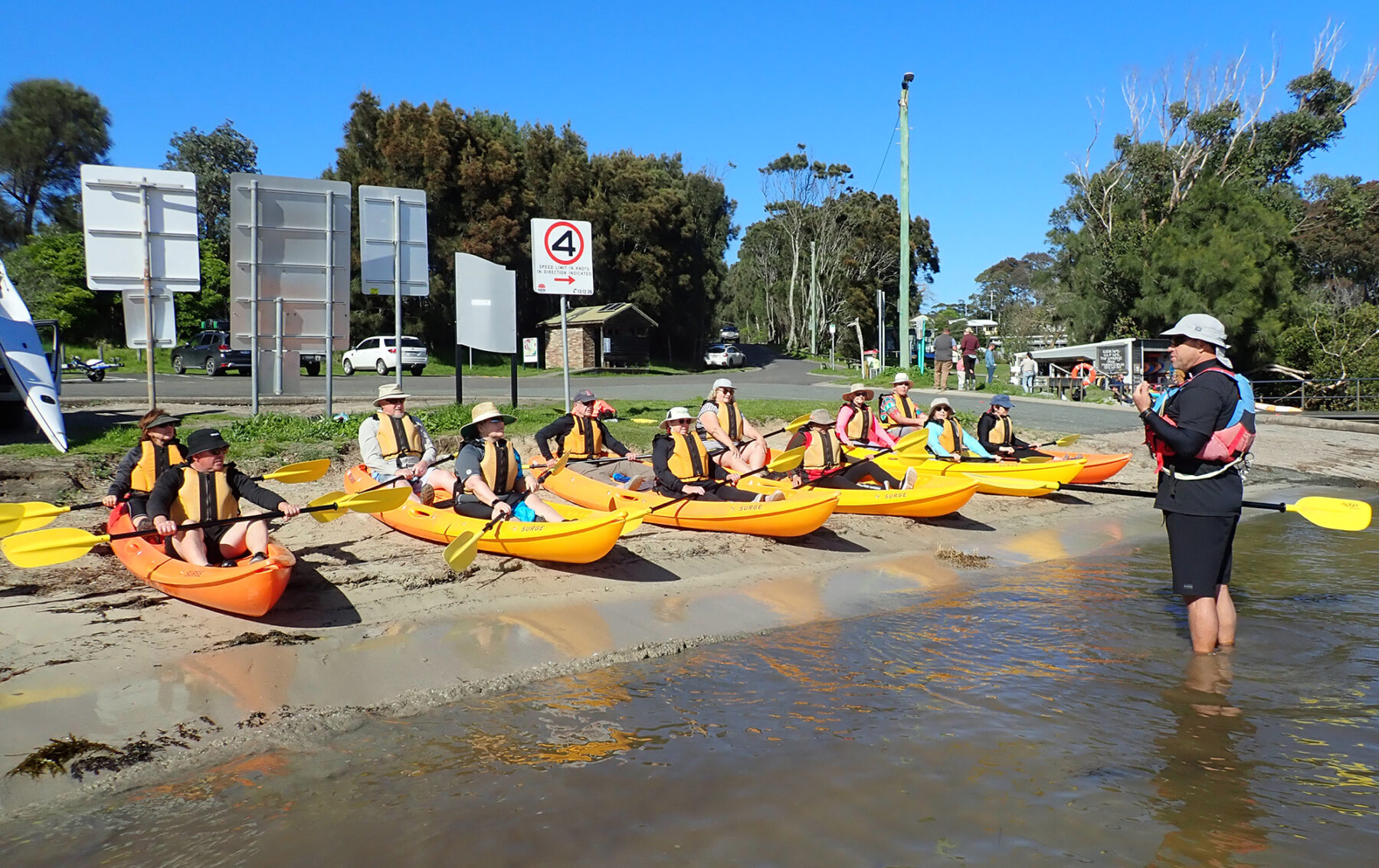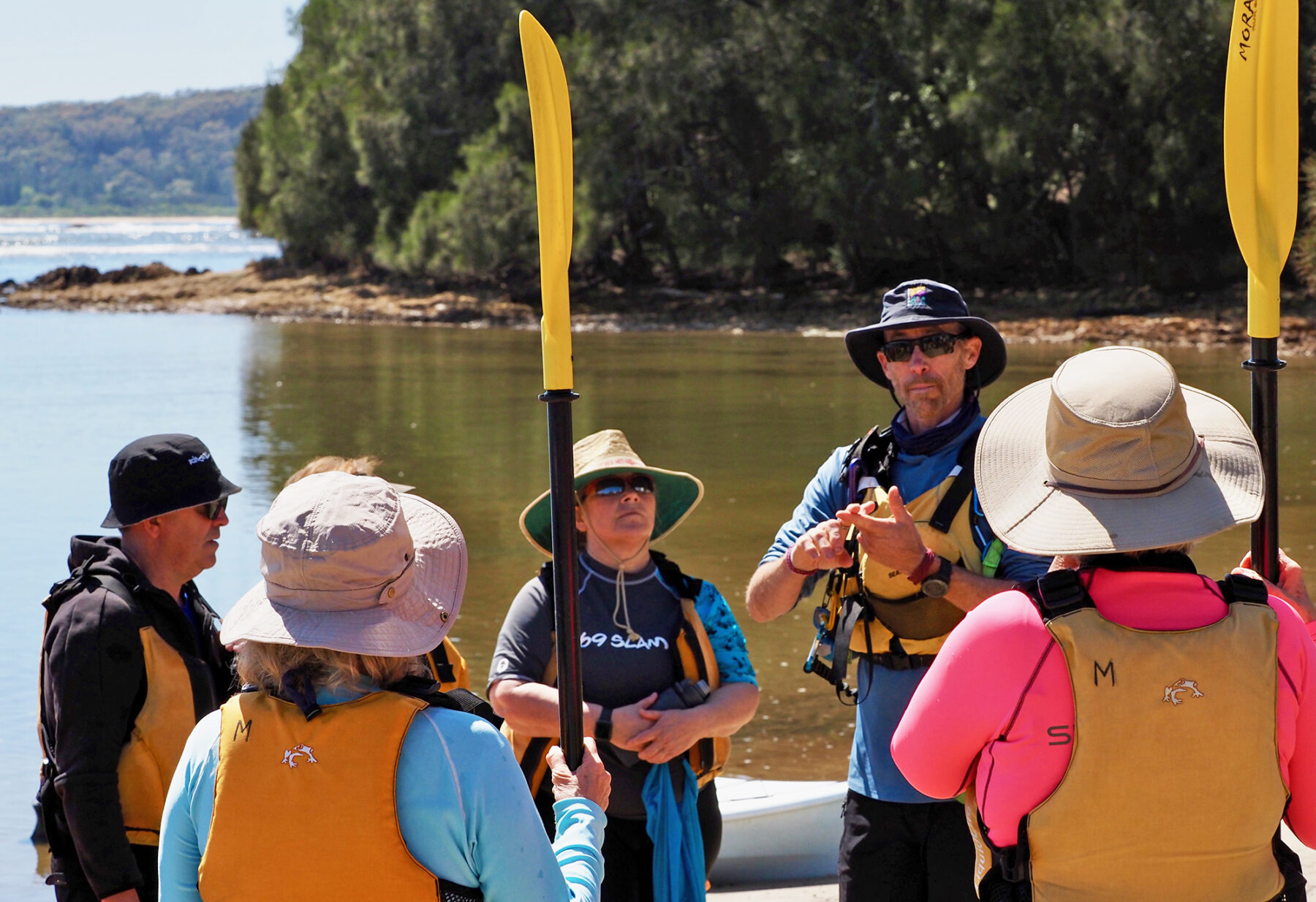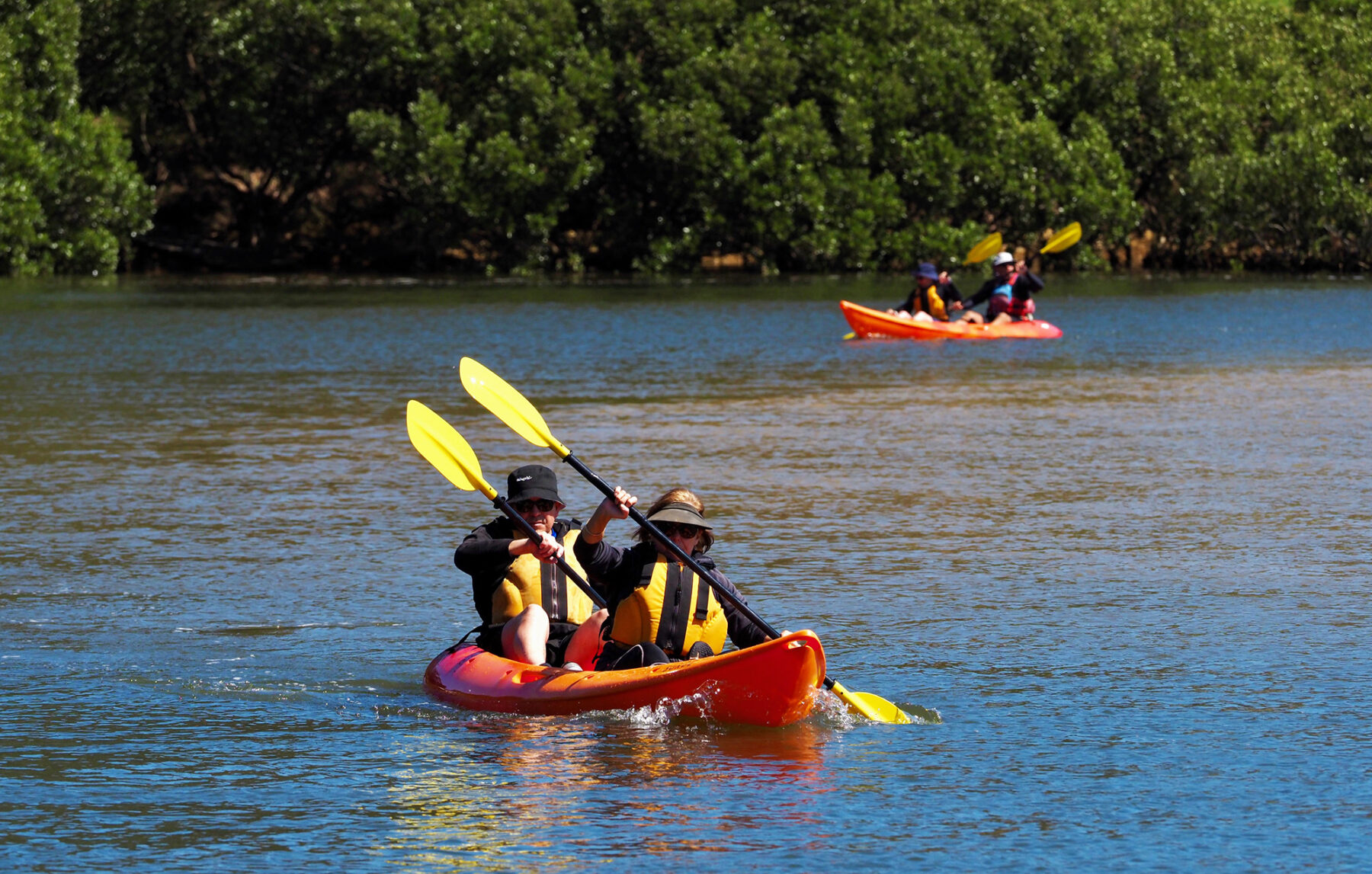Young at heart, strong in mind: A kayak school for the ages

Ever heard the saying, ‘Not your grandma’s [insert activity]?’ It’s used to imply that unlike Grandma, the activity in question is not traditional, or basic or boring. But Region X, based at the far south coast of New South Wales, is running a kayak school that is specifically designed for grandmas, grandpas and those of a more, shall we say, mature persuasion. And it’s anything but run of the mill. They’re taking beginners onto the water and out of their comfort zones. Zipping them into life vests and showing them what their bodies and minds are capable of. And ultimately challenging the perceptions around what growing older should look like.
I headed down to check out the first ever lesson of the Young at Heart program late last year. The last 45 minutes of my three-and-a-bit hour drive was a white-knuckle ride as I battled to avoid the worst of the potholes. The Eurobodalla Coast is about four hours south of Sydney and, like much of New South Wales, had experienced record-breaking rains and the roads showed the damage.

As a result, Mossy Point’s Tomaga River, literally lapping at the doorstep of the Region X headquarters, wasn’t its usual crystal-clear colour. Instead, it resembled something closer to a strong cup of tea. But despite all that, Mossy Point is beautiful, wild but with a tranquillity to it, and it’s easy to see why it is such a popular holiday destination for Canberra residents (it’s only two-ish hours from the nation’s capital) and, increasingly, Sydneysiders, too. Locals sit around in BYO camping chairs, drinking coffee, and chatting. Huge, steel-grey smooth rays patrol the water’s edge, unworried by the local dogs bouncing around them, waiting for the scraps as the fisherman clean their haul.
An unexpected lesson
When I arrive, David Decorte, in his wide brim hat and sunglasses looking every bit the guide that he is, asks, “Have you got 10 minutes to actually go through a little program? We’ll put you in a lifejacket and out on the water?” It seemed an innocent enough question and so I nodded, pretending that I was game for anything when I was most certainly not game for anything. Around me, a dozen or so people milled about smiling and chatting, their faces flushed, their eyes sparkling. They’d all just completed their first two-hour lesson and not only seemed to have survived but were buzzing from the experience.
I scanned his face for a reaction as I sheepishly asked, “Which end of the kayak is the front? Is it the pointy end?” If he was having second thoughts, he didn’t show it. And so, I sat with a thump and a wobble on the sit-on-top kayak, all the while practicing some deep-breathing so I wouldn’t drop everything and run in the opposite direction. I kept one eye on those who had just finished their lesson, as they grabbed coffees and each other’s details.

Honestly, they just didn’t look like the kind of people I had expected to find at a program aimed at seniors. They appeared fearless or at least happy to face their fears head on. They clearly were keen to try new things. They did not look ‘old’. At least, not in the way I had thought older people looked. There was some grey hair, sure. One or two wrinkles. But there were no hobbled bodies. No walkers or canes tucked off to the side. No one was hunched over, clutching at their backs. In fact, they all looked a hell of a lot healthier than I did. Turns out, I had a bit of perception problem. Not only of what I thought aging looked like, but also how it feels and how it affects the things you can do.
As I’d find out, quite a few of these folks were already quite fit and participating in other sports. At 63, Annie Lovebrand only had one leisurely, guided paddle under her belt, but was an avid daily ocean swimmer saying, “I am now healthier and fitter than I have been for years … I love the ocean and want to try something that challenged me. I wanted to learn something new.”
Trish Brodie, one of the youngest participants at 58, already paddled on a semi-regular basis so she was initially hoping to increase her skills and to try out some different vessels but there was something else as well. “I don’t want to be scared for the next 10-20 years … I don’t want to be sitting on the sidelines wondering if I could have done that,” she explains.
Programmed for success
The Young at Heart program was the brainchild of guide and Operations Manager, Garran Carnall. If I liked using cliches, which I don’t, I’d say his middle name is ‘Adventure’. But it’s not. It’s Neal. But he does love an outdoor activity, and aside from guiding with Region X, he’s been both a scuba and mountain bike instructor. Based in the Eurobodalla, he spends much of his time soaking in the local flora and fauna and learning about the history of the region. But he noticed that there was a whole segment of the local population who just weren’t taking advantage of the area or their time. He says, “I was sitting around in a cafe with my mum and dad and I was watching all of these senior, retired people and I was going, ‘They’re not doing anything. They need to get out.”
And by ‘get out’, Garran means, go all out. This is a course entailing six two-to-three-hour lessons, that takes folks in their 50s, 60s and older, most of them kayak novices, and teaches them not just the basics so that they can go on a leisurely paddle and explore the local region, but that has them creating makeshift sails from tarps, performing rescue drills and managing some seriously challenging weather. No cancelled classes for choppy weather here.

What really stands out for 67-year-old Sherryn Bellis, is the rescue drills. “We learnt how to save others in distress, how to get back into our kayak if we fell out. This involved being tipped out in the middle of the river” she says. “It also made us realise we are stronger than we think we are and can do things we all thought were beyond us.”
“Everybody needed to know what it is like to have to rescue themselves or rescue others,” Garran explains. “The rescue day was a huge day, and it wasn’t easy for everyone, but everyone was happy that they got to do it and learn some valuable skills.”
As to why he’d create such an intensive course, it makes sense when you learn a bit more about the people who raised him. His dad already paddles a kayak, and Garran says his mum was part of the inspiration for the program. “I taught my mum to scuba dive at the age of 60 and she’s a left leg amputee. And she’s been to places where she’s gone through shipwrecks, caves and she just paddles through. She’s done some amazing trips and that’s what gave me the idea to say, you can do this, doesn’t matter what age you are. You can get out there and do some really cool stuff.”
Age shall not weary them
While the idea of doing cool stuff sounds good, bodies, even very healthy bodies, do slow down with age. There’s the expected aches and pains and injuries acquired over the years. Garran says the low impact nature of the sport and the ability to choose your location makes it a sport for everybody, literally. “Doesn’t matter if you’ve got a disability or not, you can paddle. Or you can go out and be with someone who can paddle. It’s inclusive for everybody.”
Annie says, “Most of us had various bits that didn’t work as well as when we were younger – backs, shoulders, etc., but Garran suggested ways to negotiate these issues.” Trish, whose own father is 94 and still lives at home, mowing his lawn and chopping his own wood says, “He’s a really good model of someone who pushes himself to what he thinks he can do, not what he can’t do anymore. He still chops wood, but he doesn’t chop it like he did 20 years ago… He says, ‘I have to keep adapting things’.”

And maybe that’s the trick. When I finished up my short paddle with David, I ended up looking and feeling like I expected the older participants would. I was hobbled over and clutching at my back. I felt like I couldn’t do it; that kayaking wasn’t for me. But having spoken to Annie and Trish and Sherryn, I’m thinking of giving it another try, albeit with an adaptation or two, and an overall change in attitude. “Our time here is not infinite,” Annie says. “Seizing these opportunities especially as we age, gives us the opportunity to feel joy in our natural surroundings as well as a sense of achievement in rising to a challenge that we may have doubted we could do.”
Fact Box
Getting there: The Eurobodalla Coast region runs from South Durras in the north to Tilba in the south and includes popular tourist towns, such as Batemans Bay, Nelligen, Broulee, Moruya, Narooma, Bodalla, Tuross Head, Dalmeny and Tilba. Mossy Point, next-door to Broulee, is around 4.5 hours’ drive from Sydney (via the Princes Highway), or approximately 2.5hrs from Canberra (via the Kings Highway, then Princes Highway).
Best time to go: Summer is peak tourist season on the Eurobodalla, but its temperate climate makes it an all-year destination for outdoor enthusiasts.
Paddling: Kayak, canoe or SUP, there is plenty of paddling on offer here, thanks to the region’s four river systems, 83 beaches and 20 lakes.
Region X: Josh and Kate Waterson run Region X and, along with their experienced guides, offer a true one-stop shop for a wide variety of kayak adventures and classes in the Eurobodalla region. From half- to full-day (and longer) paddling trips, to expert tuition, to camping trips and hiking adventures, Region X has something for any visitor.




